North Coast Rocketry SR-99 HyperSwift
North Coast Rocketry - SR-99 HyperSwift {Kit} [2012-]
Contributed by Robert A. Morstadt
| Construction Rating: | starstarstarstarstar_border |
| Flight Rating: | starstarstarstarstar_border |
| Overall Rating: | starstarstarstarstar_border |
| Published: | 2013-10-07 |
| Diameter: | 2.64 inches |
| Length: | 37.00 inches |
| Manufacturer: | North Coast Rocketry  |
| Style: | Futuristic/Exotic |
 Brief
Brief
The SR-99 is a futuristic vision of a high altitude manned air-breathing and rocket vehicle. It is a single stage rocket that uses either 29 mm F or G motors with parachute recovery. This is a North Coast Rocketry kit designed by Matt Steele. I have built this kit stock with just one modification using a parachute protector. Some builders on the internet have enhanced the looks with customized paint jobs. The decal sheet has a lot of detail, so that the model looks good even without customization.
Components
The kit comes with an 8-page detailed instruction booklet with many photos describing the step-by-step construction. The length is 37" with a 2.64" diameter. The Vehicle Data Sheet lists the weight without motor as 15.8 oz. The second page of the instructions lists the components as follows:
- Nose Cone
- Body Tube
- Motor Tube
- Fin Set (3 pcs)
- Decal
- Instruction Sheet
- Alignment Guide (3pcs)
- Forward Centering Ring
- Aft/Mid Centering Ring
- Launch Lugs (2)
- Cable
- Loop Sleeve Connectors (2)
- Kevlar Line
- Elastic Line
- Wood Strip
- 36" Parachute (Std kits only, my kit did not have a parachute and so I had to buy it separately)
All the wood parts are laser-cut modeling wood and are quite strong. At first glance as shown in the photo below it may look like the kit has a lot of parts, but three of the parts are for the fin guide, so there is really not that many parts.

Construction
The wings are composed of three strong parts and go together easily. Likewise, the fin and ram-jet tube guide goes together easily and I found props to hold things in place as the epoxy cured as shown in the photos below.

Later, I found that the fin and tube guide was a little bit warped, so that when I attached the (ram-jet) tubes I needed to used a heavy book on top as shown in the photo below to keep everything aligned.

One of the unusual things that I found was the way the recovery cable was attached to the motor mount tube and later to the elastic line and kevlar line. Loop sleeve connectors were used with a crimping tool as shown in the photo below.

The kit does not come with any parachute protection from hot ejection gases. I had a 9" x 9" square of nomex parachute protector in my inventory that I slid above the cable. Apogee calls these "re-usuable wadding" and it worked very good. The instructions called for a 36" parachute, but I used a 30" from Top Flight and it worked fine.
Finishing
I followed the instructions for finishing and liked the results. I did not bother with filling the slight body tube spiral. I used Rust-oleum Utra Cover Flat White Primer to start and Rust-oleum Appliance Epoxy Gloss White for finishing. Both are in rattle cans. Just like saying that "clothes make the man", on this model the decals make the rocket. The decals are vinyl and look strong and sturdy. My only complaint is that for me the cockpit decal, which goes on the nose cone curved surface, tends to lift and wrinkle a lit bit. A light spray with clear coat did not change the wrinkles.
Flight
The flight was very good on the recommended Aerotech Single Use F50-6. The wind was strong, probably at about 10 mph and the rocket wind cocked slightly towards the peak. The delay time may be a little too long. No motor retention comes with this kit. I found that the Aerotech 29 mm SU motor fit quite snugly in the motor tube. I used considerably less masking tape for the friction fit than what the instructions called for. I ended up using a piece of masking tape that was about 1/2" square on the motor aft end.
Recovery
The 9" x 9" nomex pad that I used worked fine for parachute protection. I did have a slight 1/2" zipper on the upper body tube. This may have been caused by the high winds on this day, but also the delay time could be too long. Recovery was good on a 30" Top Flight chute.
Summary
This is nice looking model that goes together quickly. It flies good in windy weather.
 |
 |
Sponsored Ads
 |
 |
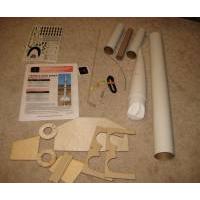
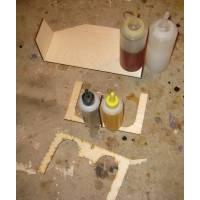
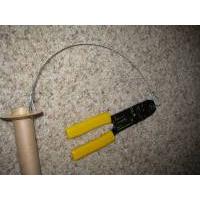
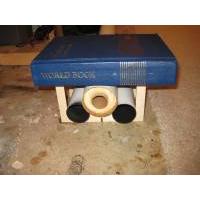
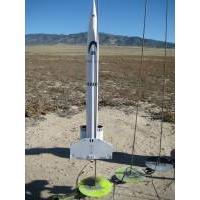












Hans "Chris" Michielssen (October 7, 2013)
This design style came from an Estes Design of the Month winner called the TOP SECRET, plan #78. Designed by Brett Simpkins
Here's a TRF page on it:
http://www.rocketryforum.com/showthread.php?25789-Estes-DOM-Top-Secret-(-78)-Gallery